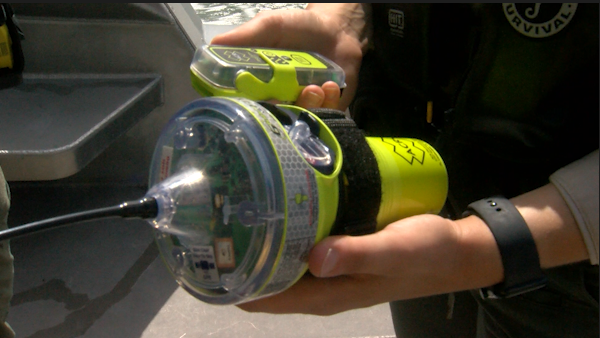“Something that we encourage people to purchase is an EPIRB, which is an emergency position-indicating radio beacon. When your boat is sinking, you don’t know if you’re going to have 10 seconds or 10 minutes,” said Capt. Randy Yanez with the Florida Fish and Wildlife Conservation Commission (FWC). FWC officers gave Gulf Coast News an exclusive look at the technology they rely on to save stranded or sinking boaters in life-or-death situations.The Emergency Position-Indicating Radiobeacon, or EPIRB, is a portable, battery-powered device activated in emergencies like storms, shipwrecks or going overboard. Once triggered, it continuously sends out a distress signal picked up by satellites operated by the international COSPAS-SARSAT program, which includes 45 countries and 65 satellites. The system is headquartered in Montreal.FWC receives that signal and uses its own technology to locate the beacon. Their equipment is accurate to within about 330 feet in open water—an essential range in what rescuers call the “golden day,” or the first 24 hours after a traumatic event, when survival chances are highest.“This is ideal for those kinds of situations, especially the ones that are moving very rapidly. It’s going to make things a lot easier and definitely increase your chances for survival,” said Yanez. EPIRB’s include both personal and boat-mounted devices, including one with a hydrostatic release. That means if the device is submerged, it activates on its own—no button press needed.“It can mean the difference of your life the folks on your boat. When you’re out in the water, God forbid you go in, you’re going to be drifting … Current, tide, wind — all those factors can influence whether you’re in your boat still or in the water. So, giving us the most exact location possible is critical,” said Officer Morgan Zeleny with FWC. The FWC says having an EPIRB on board — and knowing how to use it — could be the key to getting home safe.DOWNLOAD the free Gulf Coast News app for your latest news and alerts on breaking news, weather, sports, entertainment, and more.
“Something that we encourage people to purchase is an EPIRB, which is an emergency position-indicating radio beacon. When your boat is sinking, you don’t know if you’re going to have 10 seconds or 10 minutes,” said Capt. Randy Yanez with the Florida Fish and Wildlife Conservation Commission (FWC).
FWC officers gave Gulf Coast News an exclusive look at the technology they rely on to save stranded or sinking boaters in life-or-death situations.
The Emergency Position-Indicating Radiobeacon, or EPIRB, is a portable, battery-powered device activated in emergencies like storms, shipwrecks or going overboard. Once triggered, it continuously sends out a distress signal picked up by satellites operated by the international COSPAS-SARSAT program, which includes 45 countries and 65 satellites. The system is headquartered in Montreal.
FWC receives that signal and uses its own technology to locate the beacon. Their equipment is accurate to within about 330 feet in open water—an essential range in what rescuers call the “golden day,” or the first 24 hours after a traumatic event, when survival chances are highest.
“This is ideal for those kinds of situations, especially the ones that are moving very rapidly. It’s going to make things a lot easier and definitely increase your chances for survival,” said Yanez.
EPIRB’s include both personal and boat-mounted devices, including one with a hydrostatic release. That means if the device is submerged, it activates on its own—no button press needed.
“It can mean the difference of your life [and] the folks on your boat. When you’re out in the water, God forbid you go in, you’re going to be drifting … Current, tide, wind — all those factors can influence whether you’re in your boat still or in the water. So, giving us the most exact location possible is critical,” said Officer Morgan Zeleny with FWC.
The FWC says having an EPIRB on board — and knowing how to use it — could be the key to getting home safe.
DOWNLOAD the free Gulf Coast News app for your latest news and alerts on breaking news, weather, sports, entertainment, and more.
